Your personal information will be collected by Qwikcilver for the purchase of the gift voucher. Do you want to continue?
Membership ID:
- Main Menu ×
- Search Flights
- Corporate Travel Programme
- Group Booking
- Special Offers
- Travel Insurance
- Flight Schedule
- Check In Online
- Manage Booking
- Seat Selection & Upgrades
- Self-Service Re-accommodation
- Request Refund
- Flight Status
- Nonstop International Flights
- Popular Flights
- Partner Airlines

- Baggage Guidelines
- Airport Information
- Visas, Documents and Travel Tips
- First-time Travellers, Children and Pets
- Health and Medical Assistance

- At the Airport
- Transforming Experiences
- The Air India Fleet

- About Flying Returns
- Sign In/Sign Up
- Our Partners
- Family Pool
- Earn Points
- Spend Points
- Upgrade Cabin Class
- Points Calculator
- Customer Support

What are you looking for?

Expectant mothers and infants

Mothers-to-be and infants
Nurturing your journey, just like a mother's touch! Your selfless love inspires us to embrace you and your little one with the care you deserve.
Expectant mothers
We are committed to ensuring you have a comfortable journey with us. Your safety is our prime concern. Hence, we have a few guidelines to provide a hassle-free experience.
Travelling while pregnant
You can travel up to the 32nd week of pregnancy if there are no complications. Although, it is best to consult with your gynaecologist or obstetrician before you make any travel plans.
If there is a gap between your departure date and the date you booked your flight, you must get a medical certificate from your obstetrician.
The certificate should:
- Affirm that you can travel and that the pregnancy has no complications.
- Be issued 72 hours before departure.
Travelling beyond the 32nd week of pregnancy
- You can travel up to the 35th week of your pregnancy if you anticipate a normal delivery.
- You will be required to bring a medical certificate from your obstetrician stating that you are fit to travel and that there are no complications.
- If you are beyond your 35th week of pregnancy, we will not allow you to fly with us on account of your safety.
You will not be allowed to travel after the 32nd week in case of the following circumstances:
- You are having multiple pregnancies, i.e., twins, triplets, etc.
- Your pregnancy may be complicated, i.e., you may have suffered a miscarriage on previous occasions or had a complicated delivery in the past.
In the event of an emergency
An emergency counts as an exception and you must:
Fill out the MEDIF form .
Seek permission to travel from the Executive Director of Medical Services. Reach out to our customer service , and they will be happy to guide you.
At the airport and in the air
We understand the challenges of travelling in your condition, and we admire your strength. To make your journey smoother, we have a few provisions in place for you:
- Wheelchair assistance : Walking long distances in your condition may not be advisable. Hence, you may consider opting for our wheelchair assistance.
- Medical rooms and pharmacies: Most airports have medical rooms and pharmacies. You may head to them for assistance in discomfort or an emergency. Click here to check the facilities available at your departure and arrival airport.
- Dining options : We understand that your dietary preference might change now. Maybe you crave a particular dessert, or the baby wants to gorge on fruit. You can choose from our various dining options to select what suits you best.
- Extendable seat belt: We provide seat belt extensions inside the aircraft. Our well-trained in-flight crew will assist you with the same.
Who is an infant?
Children over seven days but under two years on the travel date are considered infants.
Documents
You need to provide valid proof of ID to verify the age of your little one.
Valid ID proof includes:
- Birth certificate
- Vaccination certificate
- A passport is a mandatory document in case of international travel.
If you cannot display valid ID proof on the day of travel, an adult fare will be charged. This is subject to the availability of seats on the flight.
We understand that your little one is your utmost priority, so we have curated special provisions for you throughout your journey.
- Nursing rooms: Most airports are equipped with nursing and mother care rooms. Click here to check the facilities available at the departure and arrival airports.
- Bassinets: We do not allow strollers on the flight. But you can request a bassinet for your little one. Infant bassinets are free of cost but are subject to availability. You can raise a request for the same using our customer support portal .
- Check-in baggage allowance: Your little one is allowed a baggage allowance of 10 kg/22 lb as check-in baggage on all our flights.
- Carry-on baggage allowance: We understand the paraphernalia needed when travelling with a baby. Hence, we allow the following as carry-on baggage: 1. Food for the little one. 2. Feeding bottles 3. A carry-on tote/bag for food and the bottles.
- Priority check-in and boarding: We want to ensure that you and your baby are seated comfortably. So, you can always request our airport staff to fast-track you through all airport formalities.
- Air travel can be a challenging experience for your little one. But our in-flight staff is available to assist you in every way to ensure you and your baby’s comfort. They have everything from hot water to earbuds for blocked ears and lavatory visit assistance.
Minimum age of travel
The minimum age of travel for your little one is seven days.
An exception to the above guidelines is possible in a medical emergency. You will need:
- A medical certificate from your paediatrician.
- Clearance from our medical department. Do reach out to our customer service and they will be happy to guide you.
Guidelines for travelling with more than one infant
When travelling with multiple infants, each baby must be accompanied by an adult. Please ensure your infant is seated on your lap, as extra seats cannot be booked for babies.
You are using an outdated browser. Upgrade your browser today or install Google Chrome Frame to better experience this site.
Pregnant Travelers

Pregnant travelers can generally travel safely with appropriate preparation. But they should avoid some destinations, including those with risk of Zika and malaria. Learn more about traveling during pregnancy and steps you can take to keep you and your baby healthy.
Before Travel
Before you book a cruise or air travel, check the airlines or cruise operator policies for pregnant women. Some airlines will let you fly until 36 weeks, but others may have an earlier cutoff. Cruises may not allow you to travel after 24–28 weeks of pregnancy, and you may need to have a note from your doctor stating you are fit to travel.
Zika and Malaria
Zika can cause severe birth defects. The Zika virus is spread through mosquito bites and sex. If you are pregnant, do not travel to areas with risk of Zika . If you must travel to an area with Zika, use insect repellent and take other steps to avoid bug bites. If you have a sex partner who lives in or has traveled to an area with Zika, you should use condoms for the rest of your pregnancy.
Pregnant travelers should avoid travel to areas with malaria, as it can be more severe in pregnant women. Malaria increases the risk for serious pregnancy problems, including premature birth, miscarriage, and stillbirth. If you must travel to an area with malaria, talk to your doctor about taking malaria prevention medicine. Malaria is spread by mosquitoes, so use insect repellent and take other steps to avoid bug bites.
Make an appointment with your healthcare provider or a travel health specialist that takes place at least 4-6 weeks before you leave. They can help you get destination-specific vaccines, medicines, and information. Discussing your health concerns, itinerary, and planned activities with your provider allows them to give more specific advice and recommendations.
Make sure to bring a copy of your official immunization records with you when you travel.
Plan for the unexpected. It is important to plan for unexpected events as much as possible. Doing so can help you get quality health care or avoid being stranded at a destination. A few steps you can take to plan for unexpected events are to get travel insurance , learn where to get health care during travel , pack a travel health kit , and enroll in the Department of State’s STEP .
Be sure your healthcare policy covers pregnancy and neonatal complications while overseas. If it doesn’t get travel health insurance that covers those items. Consider getting medical evacuation insurance too.
Recognize signs and symptoms that require immediate medical attention, including pelvic or abdominal pain, bleeding, contractions, symptoms of preeclampsia (unusual swelling, severe headaches, nausea and vomiting, and vision changes), and dehydration.
Prepare a travel health kit . Pregnant travelers may want to include in your kit prescription medications, hemorrhoid cream, antiemetic drugs, antacids, prenatal vitamins, medication for vaginitis or yeast infection, and support hose, in addition to the items recommended for all travelers.
During Travel
Your feet may become swollen on a long flight, so wear comfortable shoes and loose clothing and try to walk around every hour or so. Sitting for a long time, like on long flight, increases your chances of getting blood clots, or deep vein thrombosis. Pregnant women are also more likely to get blood clots. To reduce your risk of a blood clot, your doctor may recommend compression stockings or leg exercises you can do in your seat. Also, see CDC’s Blood Clots During Travel page for more tips on how to avoid blood clots during travel.
Choose safe food and drink. Contaminated food or drinks can cause travelers’ diarrhea and other diseases and disrupt your travel. Travelers to low or middle income destinations are especially at risk. Generally, foods served hot are usually safe to eat as well as dry and packaged foods. Bottled, canned, and hot drinks are usually safe to drink. Learn more about how to choose safer food and drinks to prevent getting sick.
Pregnant women should not use bismuth subsalicylate, which is in Pepto-Bismol and Kaopectate. Travelers to low or middle income destinations are more likely to get sick from food or drinks. Iodine tablets for water purification should not be used since they can harm thyroid development of the fetus.
After Travel

If you traveled and feel sick, particularly if you have a fever, talk to a healthcare provider immediately, and tell them about your travel. Avoid contact with other people while you are sick.
More Information
CDC Yellow Book: Pregnant Travelers
File Formats Help:
- Adobe PDF file
- Microsoft PowerPoint file
- Microsoft Word file
- Microsoft Excel file
- Audio/Video file
- Apple Quicktime file
- RealPlayer file
- Zip Archive file
Flying while pregnant? Here’s what you need to know

Editors note: This guide has been updated with the latest information.
During pregnancy, seemingly harmless things like eating deli meat and cleaning your cat's litter box are suddenly off-limits, along with more obvious restrictions on sports like skiing and scuba diving.
But what about "grey area" activities like flying in an airplane?
There's no single set of guidelines governing air travel during pregnancy and every airline has different restrictions, timelines and requirements. Some airlines may also require a medical certificate from a primary attending doctor or midwife for air travel during the final months of pregnancy, though even that varies, with U.S. airlines typically offering more flexibility than international carriers.
In the absence of clear guidelines, TPG turned to Dr. Nithya Gopal , a board-certified OB-GYN physician and the Director of OB-GYN services at Viva Eve in New York City, for her expert recommendations on safe air travel during pregnancy.
Here's what she had to say:
Is it safe to fly when you are pregnant?
There is no evidence of adverse pregnancy outcomes due to flying, according to Dr. Gopal.
"The general consensus is that it is safest to fly in the first and second trimesters," Dr. Gopal told The Points Guy. "While the first and third trimesters tend to be when the most obstetric emergencies are going to happen, I personally become more cautious with my patients after 32 weeks because of the increased risk for premature labor and the possibility of needing urgent medical attention when you are in the sky."

The most important thing you can do, no matter how far along you are in your pregnancy, is to consult with your healthcare provider before flying.
"Any time you are planning to fly during pregnancy , you should be having that conversation," Dr. Gopal said. Your provider will be familiar with any safety precautions you should take to ensure a safe and healthy flight.
Related: Guide to flying in each trimester of pregnancy
The airline you are flying may have its own cutoff, so you will want to confirm with it beforehand whether you will be allowed to fly if you are in (or nearing) your third trimester. We've included a chart below that outlines the rules for most major airline carriers.
What can you do to stay comfortable on a flight?
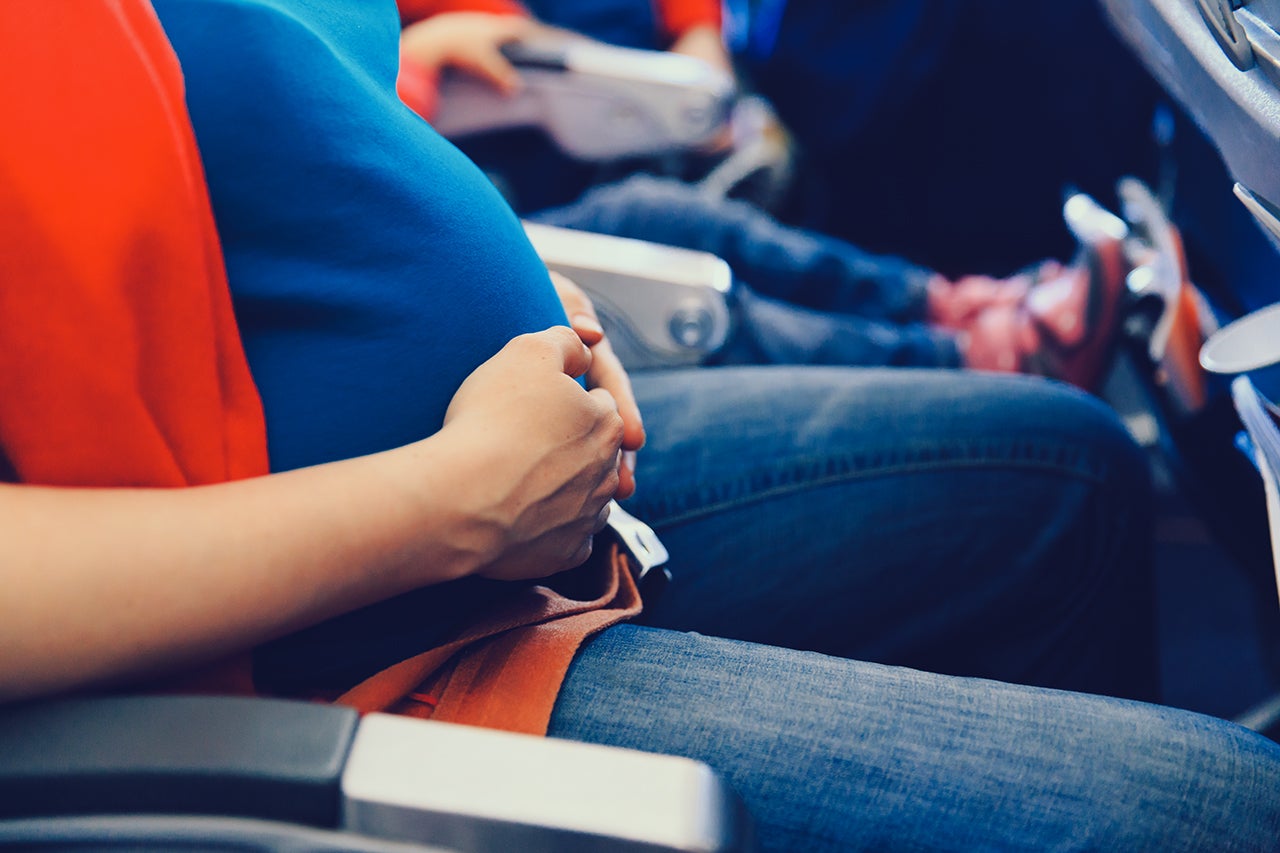
When you factor in morning sickness and general pregnancy discomfort with the increased risk for blood clots that all fliers need to be aware of, flying during pregnancy can be uncomfortable even when it is deemed safe.
Dr. Gopal shared her recommendations for addressing these common issues when you take to the (baby-) friendly skies during pregnancy. Her number one tip for staying comfortable while in flight is to wear compression socks to help maintain blood flow and reduce swelling in the legs.
In addition, "I also tell my patients to get up and move at least every hour when they are on the plane," Dr. Gopal said.
To prevent clotting, "some doctors may also prescribe a low-dose aspirin," she added. "It isn't something that is recommended by the American College of Obstetricians and Gynecologists (ACOG), but it isn't harmful, either."
If it's nausea or acid reflux that ail you, there are medications generally considered safe that you can take to alleviate your symptoms. These would be the same ones prescribed by your doctor for morning sickness, so speak with your provider before your flight to ensure you have what you need at the ready.
Dr. Gopal also advises wearing loose, unrestrictive clothing (along with your seatbelt, or course) and drinking extra fluids to counteract the pressurized air in the cabin and keep you hydrated.
"Over-the-counter Gas-X may also help with bloating that can happen as a result of the pressurized air," Dr. Gopal said.
Related: What happens when a baby is born in flight?
Must you speak with your healthcare provider before flying?

Even if your pregnancy is considered low-risk, it's always a smart idea to speak with your healthcare provider before flying. "There are a number of potential risks that go along with flying during pregnancy and those risks can change from week to week and month to month, so it's important to have that honest conversation with your doctor," Dr. Gopal said.
Related: Things You Should Do Before, During and After Flying to Stay Healthy
There are certain pregnancy conditions that may make flying more risky or unadvisable. If you are hypertensive, asthmatic or prone to clotting disorders, it's even more critical to speak with your doctor before flying.
Airline policies differ, but if you need documentation, it never hurts to include enough detail to satisfy the most stringent airline requirements.
"As with many things related to air travel, it's better to be safe than sorry," Dr. Gopal said. "It's definitely worth it, and sometimes necessary, to have medical documentation from your provider's office."
A thorough medical certificate or waiver should state:
- The number of weeks of pregnancy.
- The estimated delivery date.
- Whether the pregnancy is single or multiple.
- Whether there are any complications.
- That you are in good health and fit to travel through the date of your final flight.
Additionally, the certificate should be:
- Written on official clinic or hospital letterhead if possible.
- Signed by the doctor or attending midwife.
- Be dated no later than 72 hours before the departure date.
- Be written in clear, simple English.
Carry this certificate with you on your flight. Some airlines won't ask to see it, but others will. Some airlines also may have their own documentation requirements. See the chart below to find out which airlines require it.
Airline policies for pregnant women
Bottom line.
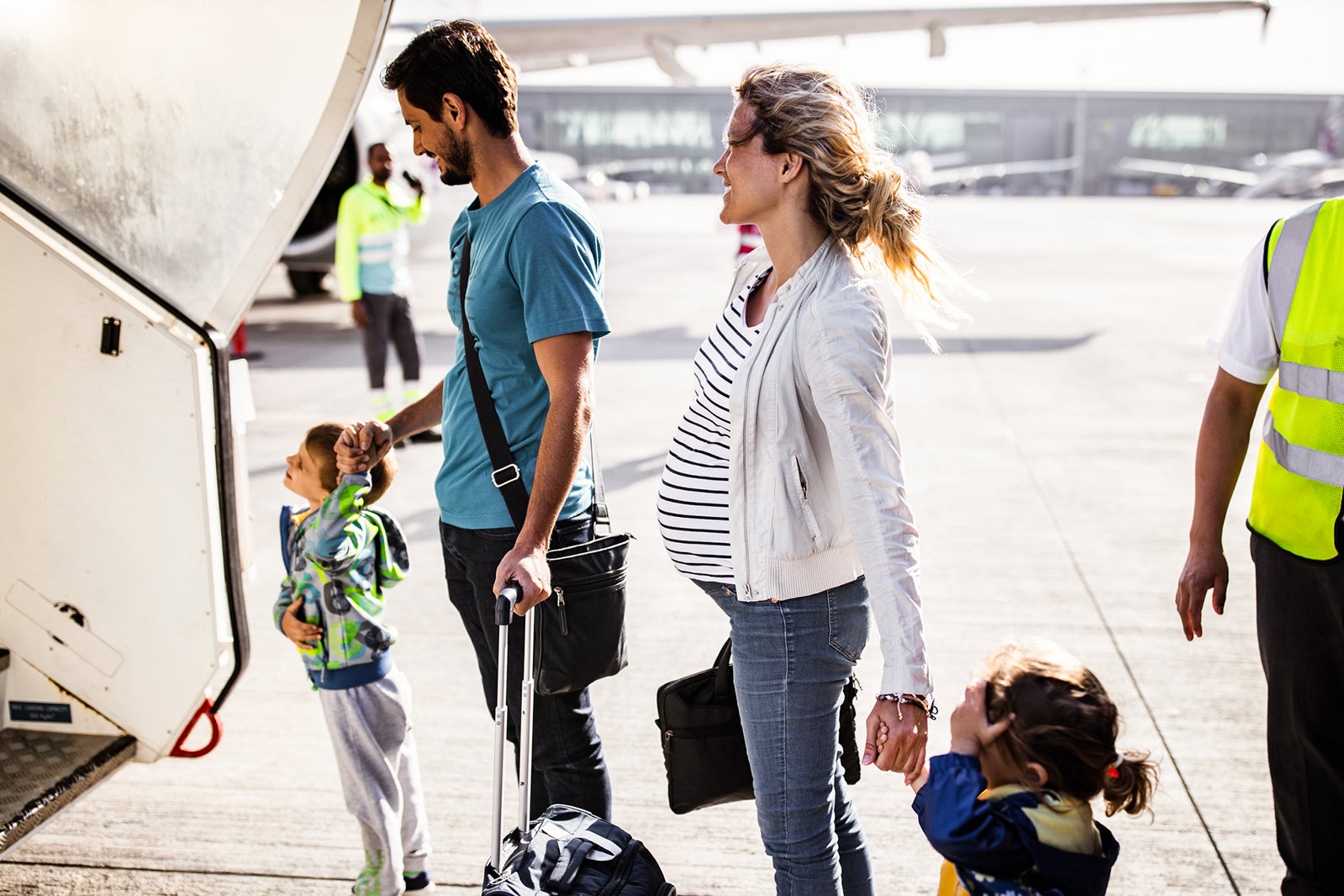
Even though it may be deemed safe, flying during pregnancy can be uncomfortable — and it is perfectly acceptable to implement your own cutoff for flying with your baby bump in tow. The majority of the time, though, flying is perfectly safe during pregnancy, providing that you follow the guidelines of the airline and your healthcare provider. Read on to learn more about traveling before, during and after pregnancy:
- What to expect in every trimester of pregnancy
- 4 tips for planning travel while planning a pregnancy
- Babymoon boom! These are the top 10 spots for a US getaway before the baby comes
- Flying with a baby checklist
Additional reporting by Katherine Fan and Tarah Chieffi.
- Search Please fill out this field.
- Newsletters
- Trip Planning
Flying While Pregnant? Check Out the Policies on 25 Global Airlines
In the absence of obstetric or medical complications, occasional air travel during pregnancy is generally safe, according to the American College of Obstetrics and Gynecology (ACOG). Like other travelers, pregnant women should use seat belts while seated.
Most commercial airlines allow pregnant women to fly up to 36 weeks of gestation, with some restrictions on international flights.
ACOG does not recommend air travel for pregnant women with medical or obstetric conditions that may be exacerbated by flight or that could require emergency care. It advises checking flight durations when planning travel and that the most common obstetric emergencies occur in the first and third trimesters.
Once aboard a flight, conditions including changes in cabin pressure and low humidity, coupled with the physiologic changes of pregnancy, do result in adaptations, including increased heart rate and blood pressure, reports ACOG. And those traveling on long-haul flights face the risks associated with immobilization and low cabin humidity. This can cause issues such as lower extremity edema and venous thrombotic events.
ACOG recommends preventive measures to minimize these risks, including the use of support stockings, regular movement of the lower extremities, avoid wearing restrictive clothing and encourage regular hydration. It also advises against consuming gas-producing foods or drinks before a flight.
Other ways for pregnant women to be comfortable on their flights include: booking a bulkhead seat for more legroom; reserving an aisle seat for easy access to lavatories and to walk; elevating your legs on a carry-on bag to avoid swelling and cramps; and wearing a layered, comfortable outfit for changing cabin temperatures.
Airlines around the world have different rules and regulations on when and how long pregnant women can fly. Below are the policies from 25 airlines around the world.
The French flag carrier does not require pregnant women to carry a medical certificate for travel during pregnancy. It recommends avoiding travel in the final month of pregnancy, as well as during the first seven days after delivery. The airline also recommends expecting mothers seek their doctor's opinion before traveling.
India’s flag carrier allows expectant mothers in good health to fly up to and including their 27th week of pregnancy. After 27 weeks, if the pregnancy is anticipated to be a normal delivery, an expectant mother will be accepted for travel up to the 35th week, but a medical certificate confirming the mother is fit to travel is required by an attending obstetrician and dated within three days of travel.
Air New Zealand
For single, uncomplicated pregnancies and clearance from a doctor or midwife women can take flights more than four hours up to the end of their 36th week. For flights under four hours, it's up to the end of the 40th week. Women pregnant with twins can fly more than four hours up to their 32nd week and less than four hours until the 36th week.
The airline recommends that women past their 28th week carry a letter from a doctor or midwife that says you are fit for travel, confirming your pregnancy dates and that there are no complications.
The airline's medical team must offer clearance for women experiencing the following: a complicated pregnancy, such as placenta previa or bleeding; a multiple pregnancy; a history of premature labor; or have begun the early stages of labor.
Italy's flag carrier has no travel restrictions for expectant mothers during the first eight months of pregnancy. But if traveling within the last four weeks of pregnancy, expecting multiple births, or having a complicated pregnancy, medical clearance is required. Completion of a Medical Information Form, MEDIF , prior to travel and signed by both the passenger and doctor is required.
Alitalia advises pregnant not to fly seven days prior to and seven days after giving birth, or if there is a risk of a premature birth or other complications. It will make staff available to escort pregnant women from the airport check-in counter to the boarding gate. Staff onboard the flight will help stow carry-on luggage. Seats can be pre-assigned and women cannot sit in an exit row.
All Nippon Airways
The Japanese carrier requires women within 15 to 28 days of their due date to fill out and carry a medical information form . Women within 14 days of their due date are required to have a medical form and travel with a doctor. The form must indicate there are no complications of pregnancy, that the passenger has no health problems preventing them from flying and the due date. It must be completed by a doctor and submitted no more than seven days prior to departure.
American Airlines
The Fort Worth-based carrier has different rules for international and domestic flights. If a due date is within four weeks of a flight, you must provide a doctor’s certificate stating that you’ve been recently examined and you’re fit to fly. For domestic flights under five hours, pregnant women won’t be permitted to travel within seven days (before and after) their delivery date. Those who need travel within this timeframe will need approval from a physician and help from a special assistance coordinator . The pregnant woman's physician will be required to fill out a passenger medical form before a flight. A special assistance coordinator will send the form directly to your physician.
Clearance from a special assistance coordinator is required for international travel or travel over water. Within four weeks of a due date also requires a physician's note stating that you’ve been examined within the past 48 hours and you’re fit to fly. And seven days before or after delivery also requires a passenger medical form to be completed by your physician.
British Airways
The U.K. carrier does not allow pregnant women to fly after the end of the 36th week if you are pregnant with one baby or the end of the 32nd week if you are pregnant with more than one baby. While it isn't mandated, British Airways recommends all expecting mothers carry a confirmation from a doctor or midwife, such as a letter or certificate, in addition to your pregnancy record. It should be written within seven days prior to travel and confirm your approximate due date, that you're fit to travel and that there are no complications with your pregnancy.
Cathay Pacific
Hong Kong's flag carrier requires that women with pregnancies after 28 weeks carry a medical certificate, dated within 10 days of travel that states the following:
- single or multiple pregnancy
- estimated week of pregnancy
- expected due date
- certifying you are in good health and the pregnancy is progressing normally, without complications
- that you are fit to travel
The airline accepts pregnant women with uncomplicated single pregnancies to travel up to 36 weeks and uncomplicated multiple pregnancies up to 32 weeks.
Delta Air Lines
The Atlanta-based carrier does not impose restrictions on flying for pregnant women, so a medical certificate is not required to travel. But the airline will not waive ticket change fees and penalties for pregnancy. The airline recommends that those flying after their eight month should check with their doctor to be sure travel is not restricted.
The U.K.-based airline has no restrictions for pregnant passengers traveling up to the end of the 35th week of single pregnancies and the end of the 32nd week for multiple pregnancies.
Pregnant women can travel up to their 29th week without a medical certificate. After that, they require a certificate or letter signed by a qualified doctor or midwife that states whether the pregnancy is single or multiple, is progressing without complications, includes an estimated due date, that you are in good health and there's no known reason to prevent you from flying. Pregnant passengers are not allowed to fly after the 32nd week of a multiple pregnancy, and after the 36th week of a single pregnancy.
This Abu Dhabi-based carrier allows women with single or multiple pregnancies to travel during the first 28 weeks without a medical certificate. For single pregnancies between 29 and 36 weeks, a medical certificate is required. After 37 weeks, pregnant women will not be allowed to travel. For multiple pregnancies, a certificate is required between the 29th and 32nd week; after that, women will not be allowed to travel.
The medical certificate must include the following:
- Be issued and signed by a doctor or midwife
- Written on a clinic/hospital letterhead and/or stamped by the doctor or midwife
- State that the guest is fit to fly
- State if the pregnancy is single or multiple
- State the number of weeks of pregnancy and the Expected Date of Delivery
- Easily understood and written in Arabic or English. Other languages are accepted but must be verified by Etihad Airways' check-in staff
The original medical certificate shall be accepted for the whole journey (originating, return and stopover flights), provided the above validity criteria is met for each sector. And it is valid for three weeks from the date of issue.
The New York-based carrier does not allow pregnant customers expecting to deliver within seven days to travel unless they provide a doctor's certificate dated no more than 72 hours prior to departure stating that the woman is physically fit for air travel to and from the destinations requested on the date of the flight and that the estimated date of delivery is after the date of the last flight.
The Dutch flag carrier recommends pregnant mothers not fly after the 36th week, along with the first week following delivery. For those expecting more than one baby, the carrier recommends consulting with a physician prior to flying. If you have had complications, you always need to have permission to fly from your physician.
Expectant mothers with complication-free pregnancies can fly on the German flag carrier until the end of the 36th week of pregnancy or up to four weeks before their expected due date without a medical certificate from a gynecologist. But the airline recommends that pregnant women beyond the 28th week have a current letter from a gynecologist that includes confirmation that the pregnancy is progressing without complications and the expected due date. The doctor should expressly state that the patient’s pregnancy does not prevent her from flying.
Because of the increased risk of thrombosis during pregnancy, the airline does recommend that expectant mothers wear compression stockings while flying.
Malaysia Airlines
The Malaysian flag carrier requires medical clearance for expectant mothers approaching 35 weeks for international travel or 36 weeks for domestic travel. If medical clearance is required, the MEDIF application form should be completed by a doctor and submitted to the airline through its ticketing offices or travel agents at least five working days before traveling.
Philippine Airlines
An expectant mother who is in normal health and with no pregnancy complications will be allowed to fly after filling out an EMIS form . Pregnant women may be accepted for travel if they are not beyond 35 weeks when they fill out Part One of the EMIS form. Those between 24 and 32 weeks of pregnancy will have to fill out EMIS Form Part 2. And if the expectant mother is below 21 years of age, the consent in writing of the husband, parent or guardian must be secured. For expectant mothers beyond 32 weeks of pregnancy, EMIS Part 3 must be accomplished by the Flight Surgeon or Company Physician, who shall issue the clearance for travel
After the 28th week, women are required to have a certificate or letter from a registered medical practitioner or registered midwife confirming the delivery date, whether it's a single or multiple pregnancy and that the pregnancy is routine.
For flights longer than four hours, women can fly up to the end of the 36th week for single pregnancies and the end of the 32nd week for multiple pregnancies. For flights under four hours, women can travel up to the end of the 40th week for single pregnancies and the end of the 36th week for multiple pregnancies. The carrier requires medical clearance if there are pregnancy complications or it's not a routine pregnancy.
Qatar Airways
No doctor's note is required for women traveling through their 28th week of pregnancy. Expectant mothers can fly between week 29 and week 32 with a doctor's note and a pregnancy with no complications. Those with a multiple pregnancy will need a doctor's note and a Medical Information Form (MEDIF) . Between weeks 33 and 35, women will need a doctor's note and a MEDIF. The airline does not accept women in their 36th week and beyond.
The low-cost Irish carrier allows expectant mothers to fly up to their 28th week of pregnancy. After that, the airline requires women to have a ‘fit to fly’ letter from their midwife or doctor. For an uncomplicated single pregnancy, travel is not permitted beyond the end of the 36th week of pregnancy, while the cut-off for an uncomplicated multiple pregnancy is 32 weeks.
Singapore Airlines
For uncomplicated single pregnancies, the carrier restricts expectant mothers from travelling beyond the 36th week of pregnancy; for uncomplicated multiple pregnancies, the restriction is the 32nd week.
For uncomplicated single pregnancies between 29 weeks and 36 weeks, expectant mothers must provide a medical certificate stating the following: (1) fitness to travel, (2) number of weeks of pregnancy and (3) estimated date of delivery. The certificate should be dated within ten days of the date of the first flight exceeding 28 weeks of pregnancy. This certificate will have to be presented at check-in when requested.
Southwest Airlines
The Dallas-based carrier advises expectant mothers at any stage of pregnancy to consult with their physicians prior to air travel. The airline recommends against air travel beginning at the 38th week of pregnancy. It warns that in some cases, traveling by air has been known to cause complications or premature labor. Depending on their physical condition, strength, and agility, pregnant women may, in some cases, be asked not to sit in the emergency exit row.
Turkish Airlines
Turkey's flag carrier allows mothers pregnant with one child to travel between the 28th and 35th week if they have a doctor's report that includes the phrase, “There is no particular reason for the patient not to fly.” For women pregnant with more then one baby, the travel cut-off is the end of the 31st week with a doctor's report. The report has to be no more than seven days from the travel date.
United Airlines
Any woman in the first 36 weeks of pregnancy will be allowed to travel on the Chicago-based carrier without medical documentation. An expectant mother traveling after the 36 weeks of pregnancy must have the original and two copies of an obstetrician’s certificate, which must be dated within 72 hours of a flight’s departure. The original certificate should be submitted to a United representative at check-in.
Virgin Atlantic
The London-based airline allows travel without restrictions until the 28th week of pregnancy provided that you're free from complications to that point. The carrier asks pregnant mothers to inform its Special Assistance department so they can offer appropriate inflight health advice. Between the 28th and 36th weeks of pregnancy, a doctor's or midwife's certificate is required, stating that the passenger is safe for travel and the expected due date (32 weeks if carrying multiples in an uncomplicated pregnancy). Beyond the 36th week of pregnancy, travel is only permitted for medical/compassionate reasons and the pregnant passenger is required to be accompanied by a medical escort. This travel is subject to the approval of a Virgin Atlantic doctor.
Related Articles
More related articles.
5 KEY Tips for Travelling during pregnancy by air in India
The other day I was talking to one of my friends who is expecting and we were discussing about the different airline guidelines during pregnancy by air tarvel in India. While talking to her, I recollected the time when I was pregnant with my son in 2018. When I was in my 28th week, I had to plan an unavoidable air travel from Mumbai to our hometown, Chandigarh. It took me a lot of time, banging my head on one website and another, to plan my pregnancy travel by air. I never though that it will be so difficult for pregnant women.
Through that exhaustive research I was able to help my friend. That’s when it struck me to compile all the information for every expecting mom who is planning to travel by air. Reason could be anything. While tech has kept us connected to each other but sometimes flying becomes inescapable. At times that implies to even a Babymoon away with your better half or an outing to a place that has constantly been on your bucket list. At that point flying is something you’ve got to do.
Regardless of whether you’re travelling during pregnancy on a short flight or preparing for a long stretch flight, I have tips on what to pack, how to experience security peacefully and what you have to know as far as safety is concerned.
At the point when you’re pregnant, travelling can be overwhelming, however trust me – it’s absolutely feasible if you plan properly. When I was researching about air travel during pregnancy, I found out that all the information was available in bits and pieces and few information you only get post experiencing it. I don’t want you guys to go through the same and I have penned it down for all you guys. For I have been in the same boat as you, I absolutely understand how you feel.
So here is sharing some handy and useful tips to make your pregancy by air travel experience easier.
COVID19 GUIDELINES
Kindly click here to download COVID19 guidelines for air travel in India as issued by Ministry of Civil Aviation for Air travel. Follow the same to have safe travel. COVID19 guidelines for air travel are also availble on their website: Ministry of Civil Aviation, India .
TIP #1 – KNOW WHEN CAN YOU FLY AND WHAT YOUR INSURANCE COVERS!
In the first, second, or third trimester? You’re presumably pondering when it’s ideal to fly.
- For some people, the principal (1st) trimester is more troublesome due to morning sickness. Regardless of whether it’s due to food repugnance or motion sickness, flying can surely fuel that up further.
- Primary (1st) trimester comes with a higher danger risk of miscarriage. So there is a need to be super extra careful if planning a travel during 1st trimester.
- In case you’re arranging a Babymoon, unquestionably, hold up until you’re well and reach the subsequent (2nd) trimester. It makes you feel more relaxed healthwise. Most importantly, don’t forget to consult your travel plans with your doctor well in advance.
You may likewise need to check airline rules.
- Numerous air carriers won’t let you fly following 28 weeks without a note from your physician, while numerous travel insurance companies, won’t cover up any retractions after your 32nd week (24 weeks for multiples).
- If you need to fly late in your maternity, I suggest having your primary care physician’s consent and have supporting records printed and prepared, just in case you’re asked or questioned at check-in.
- In case you’re travelling international, check the arrival country’s regulations for admitting pregnant ladies. Ensure that you’re mindful of what clinical administrations they can provide.
DOMESTIC FLIGHT RULES FOR TRAVELLING DURING PREGNANCY BY AIRLINES IN INDIA
(for major cariers)
Since all suppliers are separate entities , it is vital that you read the fine print from your insurance providers (including the one given by credit cards and airlines) when travelling during maternity.
- Multiple insurance companies do not cover the event of premature birth or if your baby requires time in a NICU abroad as it could be viewed as a “pre existing condition.”
- You additionally need to understand what your cancellation policy is for the trip, just for the off chance that keeps you from taking the trip.

TIP #2 – BUDGET FOR EXTRA TIME AT CHECK IN
There’s nothing more regrettable than feeling hurried and on the edge when you’re travelling during pregnancy..
In case you’re somebody who is typically fine with showing up at the air terminal 45 minutes before your flight, stretch that to one and a half hour to two hours.
- This will give you an opportunity to discover somebody who can help you with your baggage, handle any surprising inquiries at check in and respond to gate changes appropriately.
- This is particularly pivotal in case you’re pregnant AND travelling with another baby.
- Showing up well before the time allows for multiple restroom breaks, spills and a truly necessary embrace from a friendly stranger or airline staff members.
TIP #3 – MAKE YOURSELF COMFORTABLE AT SECURITY
Many of us are concerned about going through screening technology or taking off our shoes in airport security.
- While all the modern scanners are built on Millimeter – Wave Body technology which is safe for all passengers including expecting females.
- It’s alright to request a physical search in case you’re not happy. At the point when you’re pregnant, you simply need to do what keeps you at ease.
- To comfort you more, the multiple manufacturers have clarified that the Advanced Imaging Technology and stroll through metal indicator frameworks don’t utilize X-beams to create the picture, yet rather use non-ionizing electromagnetic waves that are reflected off the body.
TIP #4 – HELP! HELP! HELP!
Generally, individuals love helping pregnant ladies. There is something about carrying a newborn which seems to make people warmer and kinder, and it’s something you ought to thoroughly acknowledge with great enthusiasm.
One of the off chance that you need assistance getting a thing in or out of the overhead compartment, simply let an airline steward know. Same goes for huge packs when travelling globally.
TIP #5 – DRINK WATER & EAT HEALTHY
At the point when you’re pregnant your child is actually and metaphorically draining the life out of you.
- At this point when you’re flying, you’re increasingly prone to dehydration so DRINK WATER.
- You may consider bringing an electrolyte substitution (ORS) drink on long stretch flights.
- Additionally pack sound tidbits like carrot sticks, apple cuts and almonds to keep you satisfied.
- In case you have nausea or have flying sickness, converse with your primary care physician about the prescriptions to take while on the way to your destination.
BONUS TIP – HOW & WHAT TO PACK!
Utilize a rucksack for a carry-on. This will help uniformly distribute the weight across your back and spare your sore body while trekking through the terminal.
- As far as garments, I think most of the women loves wearing something a bit sporty or free and flowy.
- Many ladies select leggings, however ensure they don’t cut into the center of your belly or in the rear of your knees.
- Circulation is required when you’re pregnant, so dress in things that let the blood stream!
- Change of garments
- Pressure socks (particularly if you’ve been encountering swollen feet.
- Huge sweater that can serve as a cover if necessary
- Carrot sticks
- Lemon cuts (in case you need to tackle nausea)
- You may likewise need to pack your own dinner as plane food can be dehydrating
- All Documents – fit to fly certificates
- To wrap things up – a novel or podcast or online series or movies on Prime or Netflix that you can dive into!
So these were the tips which you can keep handy whenever planning an air travel during pregnancy. You can also share these with someone known who might find these useful.
Hope the tips will help you to have a comfortable journey. Wish you a safe travel!
Did you find it helpful, let us know:
Click on a star to rate it!
Average rating / 5. Vote count:
As you are Happy...
Follow us on social media!
We are sorry that you are not feeling happy!
Let us improve!
Tell us how we can improve?
Submit a Comment Cancel reply
Your email address will not be published. Required fields are marked *
Save my name, email, and website in this browser for the next time I comment.
Submit Comment
This site uses Akismet to reduce spam. Learn how your comment data is processed .
Join Our Newsletter
Work With Us
JoinOur Newsletter
You have successfully subscribed, recent posts.
- Tips To End Screen Time
- 5 tips to get a newborn sleep longer
- 5 Best Books for Infants (6 months old) to Toddlers (3 years old)
- 5 Tips for Gorgeous Newborn Photoshoot Session
- Questions to ask while selecting a Newborn Photographer
Recent Comments
- spphotographystudios on 20 Best Maternity Photoshoot Ideas For Couples
- studio pearl on 20 Best Maternity Photoshoot Ideas For Couples
- Morgan Mendoza on 5 tips to get a newborn sleep longer
- Amrit Ammu on Tips To End Screen Time
- Sujata on Tips To End Screen Time
- Amrit Ammu Photography

Amrit is a certified Maternity and Newborn photographer based out of her beautiful studio in Thane, Mumbai Metropolitan Region. She's been specialising in motherhood portraits since 2013 and has won awards at international competitions in the couple of years. She has had training from renowned photographers from around the world and she's committed to newborn safety which is why she is among one of the few safety trained photographers in India. She always looks forward to provide A-Ha moments to her clients through her services.
Join our mailing list to receive the latest news, updates and offers from our team.
Pin It on Pinterest
Appointments at Mayo Clinic
- Pregnancy week by week
Is it safe to fly during pregnancy?
Generally, air travel before 36 weeks of pregnancy is considered safe for people who aren't dealing with any pregnancy problems. Still, if you're pregnant, it's a good idea to talk with your health care provider before you fly.
Your provider might suggest that you not fly if you have certain pregnancy complications that could get worse because of air travel or that could require emergency care. Examples include a history of miscarriage or vaginal bleeding, severe anemia, and high blood pressure or diabetes that's not well controlled. If you had preeclampsia during a previous pregnancy — a condition that causes high blood pressure and extra protein in urine — flying may not be advised. The same is true if you're pregnant with twins or other multiples.
Tell your provider how far you are flying, as the length of the flight might make a difference. Also, be aware that some airlines may not allow pregnant people on international flights. Check with your airline before you make travel arrangements.
After 36 weeks of pregnancy, your health care provider may advise against flying. And some airlines don't allow pregnant people to fly after 36 weeks. The airline also may require a letter from your health care provider that states how far along in your pregnancy you are and whether flying is advised.
If your health care provider says it's okay for you to fly, and your plans are flexible, the best time to travel by air might be during the second trimester. The risks of common pregnancy emergencies are lowest during that time.
When you fly:
- Buckle up. During the trip, keep your seatbelt fastened when you are seated, and secure it under your belly.
- Drink plenty of fluids. Low humidity in the airplane could cause you to become dehydrated.
- Avoid gassy foods and drinks before you fly. Gases expand during flight, and that could make you uncomfortable. Examples of foods and drinks to avoid include broccoli and carbonated soda.
- Think about medical care. Plan for how you'll get obstetric care during your trip if you need it. Bring copies of your medical information in case you need care while you're away.
Blood clots
Air travel can raise the risk for blood clots in the legs, a condition called venous thrombosis. The risk is higher for pregnant people. Moving your legs may help prevent this problem. Take a walk up and down the aisle every hour during the flight. If you must remain seated, flex and extend your ankles from time to time. In general, it's best to avoid tightfitting clothing, as that can hinder blood flow. Wearing compression stockings can help with blood circulation during a long flight.
Radiation exposure linked to air travel at high altitudes isn't thought to be a problem for most people who fly during pregnancy. But pilots, flight attendants and others who fly often might be exposed to a level of radiation that raises concerns during pregnancy. If you must fly frequently during your pregnancy, talk about it with your health care provider.
Mary Marnach, M.D.
There is a problem with information submitted for this request. Review/update the information highlighted below and resubmit the form.
From Mayo Clinic to your inbox
Sign up for free and stay up to date on research advancements, health tips, current health topics, and expertise on managing health. Click here for an email preview.
Error Email field is required
Error Include a valid email address
To provide you with the most relevant and helpful information, and understand which information is beneficial, we may combine your email and website usage information with other information we have about you. If you are a Mayo Clinic patient, this could include protected health information. If we combine this information with your protected health information, we will treat all of that information as protected health information and will only use or disclose that information as set forth in our notice of privacy practices. You may opt-out of email communications at any time by clicking on the unsubscribe link in the e-mail.
Thank you for subscribing!
You'll soon start receiving the latest Mayo Clinic health information you requested in your inbox.
Sorry something went wrong with your subscription
Please, try again in a couple of minutes
- Allergy medications during pregnancy
- AskMayoExpert. Health considerations for air travelers: Pregnancy considerations. Mayo Clinic; 2022.
- Air Travel During Pregnancy: ACOG Practice Bulletin No. 746. American College of Obstetricians and Gynecologists. https://www.acog.org/clinical/clinical-guidance/committee-opinion/articles/2018/08/air-travel-during-pregnancy. Accessed Dec. 1, 2022.
- Ram S, et al. Air travel during pregnancy and the risk of venous thrombosis. American Journal of Obstetrics and Gynecology. 2022; doi:10.1016/j.ajogmf.2022.100751.
Products and Services
- Available Solutions for Prenatal Nutrition from Mayo Clinic Store
- A Book: Mayo Clinic Guide to a Healthy Pregnancy
- Ankle swelling during pregnancy
- Antibiotics and pregnancy
- Aspirin during pregnancy
- Pregnancy back pain
- Falling during pregnancy: Reason to worry?
- Fetal ultrasound
- Flu shot in pregnancy
- Headaches during pregnancy: What's the best treatment?
- Iron deficiency anemia during pregnancy: Prevention tips
- Leg cramps during pregnancy
- Pregnancy acne
- Pregnancy and fish
- Pregnancy constipation
- Pregnancy diet: Essential nutrients
- Pregnancy due date calculator
- Pregnancy exercises
- Pregnancy nutrition don'ts
- Pregnancy stretches
- Pregnancy weight gain
- Pregnant. Now What Happens?
- Prenatal testing
- Prenatal vitamins and pregnancy
- Sex during pregnancy
- Twin pregnancy
- Vaccines during pregnancy
- Vaping during pregnancy
- Working during pregnancy
- X-ray during pregnancy
Mayo Clinic does not endorse companies or products. Advertising revenue supports our not-for-profit mission.
- Opportunities
Mayo Clinic Press
Check out these best-sellers and special offers on books and newsletters from Mayo Clinic Press .
- Mayo Clinic on Incontinence - Mayo Clinic Press Mayo Clinic on Incontinence
- The Essential Diabetes Book - Mayo Clinic Press The Essential Diabetes Book
- Mayo Clinic on Hearing and Balance - Mayo Clinic Press Mayo Clinic on Hearing and Balance
- FREE Mayo Clinic Diet Assessment - Mayo Clinic Press FREE Mayo Clinic Diet Assessment
- Mayo Clinic Health Letter - FREE book - Mayo Clinic Press Mayo Clinic Health Letter - FREE book
- Healthy Lifestyle
- Expert Answers
- Air travel during pregnancy Is it safe
5X Challenge
Thanks to generous benefactors, your gift today can have 5X the impact to advance AI innovation at Mayo Clinic.
- Logout Login
- Adventure Holidays
- Weekend Getaways
- Driving Holidays
- Travel News
Top Searches
Vande Bharat Train
Cheetos Packet Pollution
Konkan Ladakh Petroglyphs
Heavy Rains Forecast
Delhi Gurugram Traffic
Taj Mahal Replica
Can you fly while pregnant? Here's everything you need to know
Times of India TIMESOFINDIA.COM / TRAVEL TRENDS , WORLD / Created : Dec 17, 2023, 16:33 IST
You're Reading
Embarking on air travel during pregnancy is generally safe, with considerations varying by trimester. Consult your healthcare provider for personalized advice. Most airlines permit flying during the first two trimesters, but restr … Read more
Embarking on air travel during pregnancy is generally safe, with considerations varying by trimester. Consult your healthcare provider for personalized advice. Most airlines permit flying during the first two trimesters, but restrictions may apply in the third trimester. Check individual airline policies and, if needed, obtain a medical certificate. Prioritize hydration, comfort, and movement during the flight. Read less
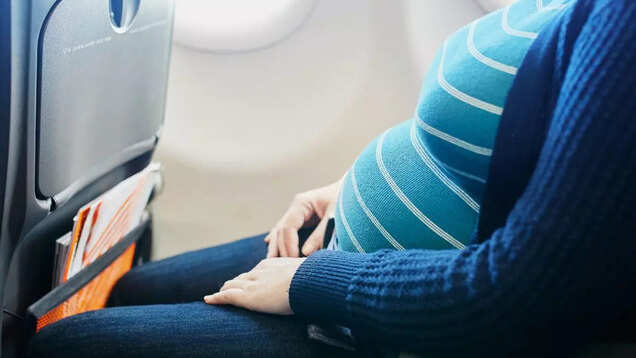
More from Travel News

World’s most visited UNESCO Heritage Sites

Comments (0)

Refrain from posting comments that are obscene, defamatory or inflammatory, and do not indulge in personal attacks, name calling or inciting hatred against any community. Help us delete comments that do not follow these guidelines by marking them offensive . Let's work together to keep the conversation civil.
Comments ( ) Sort: Newest UpVoted Oldest Discussed Down Voted closecomments

SIGN IN WITH
Or post without registration.

Visual Stories

Popular Galleries

5 must-visit places in South Goa for an unforgettable vacation TRAVEL TRENDS , GOA

5 ancient engineering marvels you must visit that continue to amaze us! TRAVEL TRENDS , WORLD

10 world cities with worst traffic congestion TRAVEL TRENDS , WORLD
Trending stories.

5 longest train routes in the world!

Ziro Music Festival 2024: Everything you need to know

Petroglyphs in Konkan and Ladakh region: The rock carvings of our prehistoric ancestors

Top 10 most expensive cities in the world

Heavy rains forecast for Uttarakhand, Delhi, and surrounding states as weather system intensifies
- 1 Can you fly while pregnant? Here's everything you need to know
- 2 Why are these bridges in Meghalaya called the Living Root Bridges?
- 3 Exploring America's top nightlife cities
- 4 Exploring Panchgani, a paradise in Maharashtra
- 5 Uttarakhand is a birding haven; here’s what to expect

THE DEFINITIVE GUIDE TO DESTINATIONS, ITINERARIES, THINGS TO DO, RESTAURANTS, NIGHTLIFE and LOTS MORE!
FOLLOW US ON
Places to visit.
- Places to visit in Bangalore
- Places to visit in Mumbai
- Places to visit in Delhi
- Places to visit in Goa
- Hotels in Goa
- Hotels in Jaipur
- Hotels in Shimla
- Hotels in Mumbai

Things To do
- Things to do in Goa
- Things to do in Mumbai
- Things to do in Bangalore
- Things to do in Delhi
Travel Inspiration
- Visa on arrival for Indians
- Honeymoon Places in india
- Hill Stations in India
- Weekend getaways in Mumbai
- Weather in Delhi
- Weather in Chennai
- Weather in Bangalore
- Weather in Mumbai
Best Beaches
- Goa Beaches
- Mumbai Beaches
- Pondicherry Beaches
- Kerala Beaches
- Restaurants in Bangalore
- Restaurants in Chennai
- Restaurants in Pune
- Restaurants in Jaipur
- Hill Station near Delhi
- Winter trip to Ladakh
- Places to visit in Kerala
- Winter Honeymoon Destinations
- UK visa guide for Indians
- Winter Trip to Manali
- Vaishno Devi Yatra
- Special Train Ticket Booking
- HP inter-state Bus
- Honeymoon Destinations India
Latest News
- Is it possible to visit 30 countries in a day? Find out if you can
- Agra: Heavy rain leads to water leakage from Taj Mahal's main dome; ASI on high alert
- Europe's weather warning: Snow and flood alerts in Austria, Germany, Czech Republic
- Mumbai: London’s pod taxis set to operate in Bandra-Kurla Complex soon
- Top 10 countries offering best quality of life in 2024; find out India’s rank
- The village of Tumbbad is for real and also the mystery surrounding it
Congratulations!
You have been successfully added to the mailing list of Times of India Travel. To complete the subscription process, kindly open your inbox and click on the confirmation link which has been emailed to you.
Share with friends
Thank You for sharing! Your friend will receive the article link on email mentioned.
- (For more than one recipient, type addresses separated by commas)
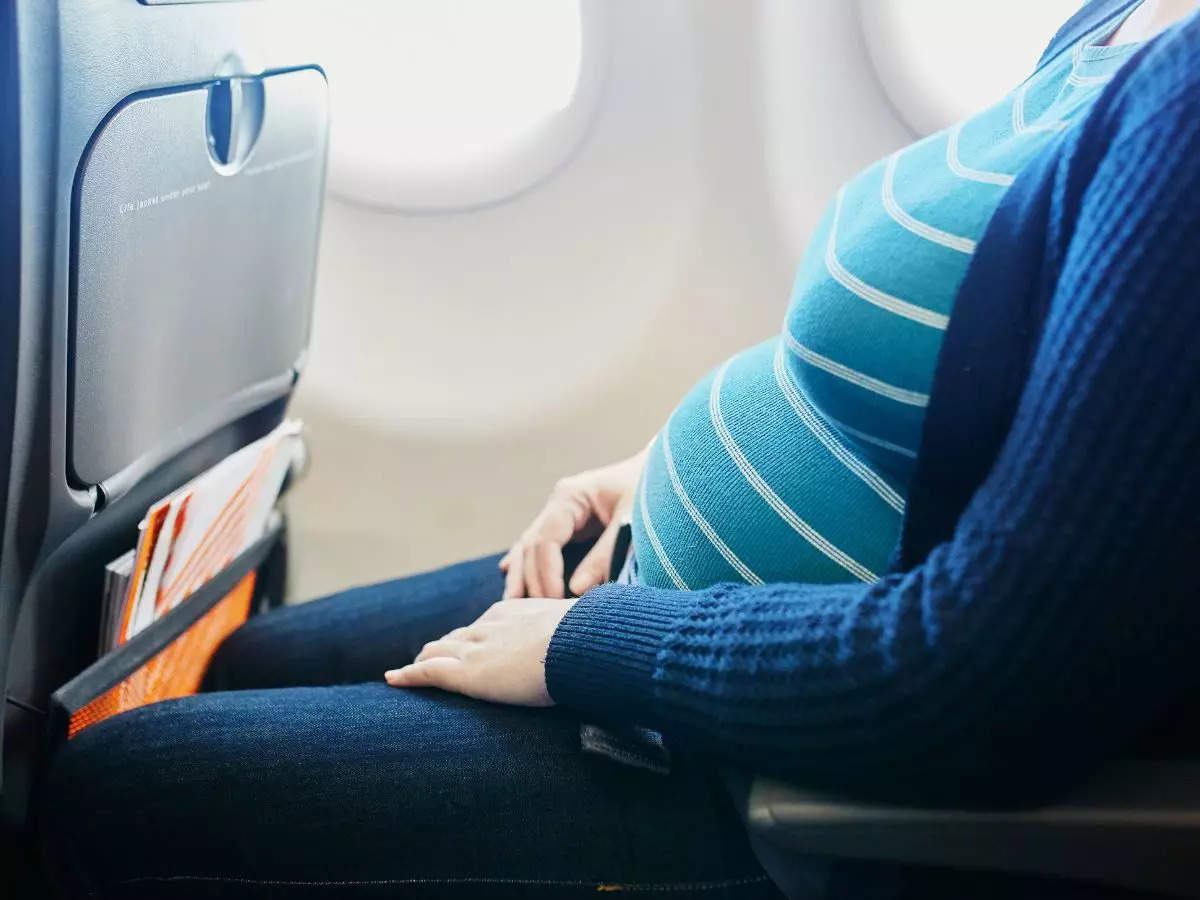
Embarking on air travel during pregnancy is generally safe, with considerations varying by trimester. Consult your healthcare provider for personalized advice. Most airlines permit flying during the f...

Advertiser Disclosure
Many of the credit card offers that appear on this site are from credit card companies from which we receive financial compensation. This compensation may impact how and where products appear on this site (including, for example, the order in which they appear). However, the credit card information that we publish has been written and evaluated by experts who know these products inside out. We only recommend products we either use ourselves or endorse. This site does not include all credit card companies or all available credit card offers that are on the market. See our advertising policy here where we list advertisers that we work with, and how we make money. You can also review our credit card rating methodology .
Flying While Pregnant – Your Guide to Airline Policies [2024]
Chris Hassan
Social Media & Brand Manager
240 Published Articles
Countries Visited: 27 U.S. States Visited: 26
Jessica Merritt
Editor & Content Contributor
109 Published Articles 553 Edited Articles
Countries Visited: 4 U.S. States Visited: 23
Keri Stooksbury
Editor-in-Chief
43 Published Articles 3389 Edited Articles
Countries Visited: 50 U.S. States Visited: 28
![travel from usa to india during pregnancy Flying While Pregnant – Your Guide to Airline Policies [2024]](https://upgradedpoints.com/wp-content/uploads/2022/03/Pregnant-woman-on-plane.jpeg?auto=webp&disable=upscale&width=1200)
Table of Contents
Flying while pregnant overview, u.s. airline pregnancy policies, international airline pregnancy policies, tips for flying while pregnant, final thoughts.
We may be compensated when you click on product links, such as credit cards, from one or more of our advertising partners. Terms apply to the offers below. See our Advertising Policy for more about our partners, how we make money, and our rating methodology. Opinions and recommendations are ours alone.
Whether heading on a vacation or babymoon, traveling for work, or visiting family for the holidays, flying while pregnant is extremely common and generally safe when following standard air travel precautions.
As always, wearing a seatbelt and staying hydrated is very important, but so is checking with your doctor, as well as your airline, to confirm any additional requirements.
Depending on your destination and airline, policies may vary, so we created a guide to help make the process just a little bit easier for expectant moms.
Let’s look at what you can expect on your next flight if you are expecting.
Many airlines allow pregnant women to fly if they haven’t passed 36 weeks of gestation .
However, that number may vary based on medical conditions as well as the destination of the flight, as international flights can have different rules.
Airline Policy Chart

Alaska Airlines
Alaska Airlines does not have any specific policy for flying while pregnant.
American Airlines
American Airlines requires pregnant passengers to provide a doctor’s certificate stating they’re fit to fly if they’re due within 4 weeks of the flight.
If the flight is within 7 days of the delivery date, your physician must complete a special approval form, and a special assistance coordinator from American Airlines will be assigned to you.
For international travel or travel over water within 4 weeks of your due date, a physician’s note stating that you are fit to fly after being examined within 48 hours of the flight is required.
Avelo Airlines
Pregnant passengers do not face any restrictions when flying on Avelo and a medical certificate is not required for you to travel.
Breeze Airways
Breeze does not have restrictions or require a medical certificate for pregnant passengers.
Delta Air Lines
Delta Air Lines has no restrictions for pregnant passengers and does not require medical clearance, regardless of the due date.
Frontier Airlines
Frontier Airlines requires a medical certificate starting at the 36th week of pregnancy.
Alternatively, a waiver may be signed at the ticket counter, releasing the airline of liability.
Hawaiian Airlines
Hawaiian Airlines requires a medical certificate if you’re due within 7 days when flying within Hawaii.
For international flights or between North America, an exam completed within 48 hours of your flight and a certificate are required if the flight is within 30 days of your due date.
JetBlue only requires a medical certificate if you’re due within 7 days of the flight. The exam must be completed within 72 hours of the departure date.
If you are past due, you will not be allowed to fly, even with documentation.
Southwest Airlines
Southwest Airlines recommends against air travel for passengers at or past 38 weeks of pregnancy but does not prohibit it.
The airline may, however, ask pregnant passengers not to sit in the emergency row.
Spirit Airlines
Spirit Airlines “urges” pregnant passengers past 8 months (32 weeks) to get a doctor’s exam before flying to confirm it is safe to travel.
However, no mention of a medical certificate being needed to fly.
United Airlines
United Airlines has no restriction for up to 36 weeks of pregnancy.
Starting the 36th week, an obstetrician’s certificate (original and 2 copies) is required, stating that mother and baby are fit for travel. The certificate must be dated within 72 hours of the flight, although it is preferred to be within 1 day of departure if possible.
The due date must be after the final flight on the itinerary.
Aeromexico passengers who are 33 weeks pregnant or more must provide a medical certificate that can be uploaded 48 hours before the flight departure.
The exam must be completed within 5 days of the flight, and it is a good idea to bring a copy of the certificate to the airport just in case.
Air Canada has no restrictions for passengers until their 36th week of pregnancy. After 36 weeks, there is no official statement or requirements.
Air France does not require medical clearance before flying. However, the airline recommends seeking a doctor’s opinion before flying.
Although it is not prohibited, Air France recommends avoiding air travel starting at 37 weeks of pregnancy.
British Airways
British Airways does not permit pregnant women to fly after the 36th week if they’re pregnant with 1 baby or after the 32nd week for more than 1 baby.
The airline recommends expectant mothers travel with a note from their doctor or midwife confirming:
- If the pregnancy is single or multiple
- Expected due date
- No complications with the pregnancy
This note should be completed as close to the travel dates as possible.
Cathay Pacific
The table below shows the requirements and certificates needed to travel for those with uncomplicated pregnancies.
Cathay Pacific advises that you may be denied boarding if you’re not carrying a required medical certificate or if that certificate is outdated or incomplete.
Emirates has flight restrictions starting at 29 weeks of pregnancy.
Expectant mothers traveling during or after 29 weeks must bring a medical certificate signed by a doctor or midwife that includes:
- Single or multiple pregnancies
- Estimated due date
- The latest date your doctor expects you to be fit for travel
- You are in good health
- That there is no known reason that would prevent you from flying
Passengers are prohibited from flying after the 36th week of a single pregnancy or the 32nd week of a multiples pregnancy.
If you need to request an exception to the rule, you can apply for medical clearance by submitting a medical information form .
Etihad Airways
Etihad Airways has flight restrictions starting at 29 weeks of pregnancy.
From weeks 29 to 36 (29 to 32 for a multiples pregnancy), a medical certificate is required to fly.
Passengers are prohibited from flying once reaching the 37th week of a single pregnancy or the 33rd week of a multiples pregnancy.
If you need to submit a medical certificate, you can download it before arriving at the airport.
Japan Air Lines requires a medical certificate for the following circumstances:
- When the expected delivery date is within 28 days or is uncertain
- When expecting multiple births
- When there were previous premature births
KLM advises expectant mothers not to fly after reaching 36 weeks of pregnancy. Getting medical clearance to fly is not required, but it is recommended.
LATAM allows pregnant passengers of up to 29 weeks to fly without authorization. From the 30th week on, a medical certificate is required.
After 39 weeks, travel is prohibited.
Lufthansa does not require medical clearance until after the 28th week of pregnancy.
Beyond the 28th week, it is recommended that you travel with a certificate that includes:
- Confirmation that the pregnancy does not have any complications
- A statement from an obstetrician stating that the pregnancy does not prevent you from flying
From the 36th week, this certificate is required to fly. In the case of twin or multiples pregnancy, flying is prohibited after the 32nd week.
Qatar Airways
Qatar Airways recommends traveling with a doctor’s certificate until the 29th week of pregnancy. After the 29th week arrives, the certificate is required.
At the beginning of the 33rd week, a doctor’s certificate, as well as a MEDIF form , is required and must include the following:
- Patient’s name and date of birth
- Estimated date of delivery
- Proposed dates of air travel
- Confirmation of uncomplicated pregnancy
- Confirmation that the patient is fit for travel
- Date, stamp, and contact details of a qualified doctor
After the 36th week of pregnancy begins, Qatar Airways will not allow you to fly, or 33 weeks in the case of a multiples pregnancy.
Singapore Airlines
Singapore Airlines has no requirements until after the 28th week of pregnancy.
From the 29th week to the 36th week (32nd week for a multiples pregnancy), a medical statement is required to fly that includes:
- Fitness to travel
- Number of weeks pregnant
This certificate must be dated within 10 days of the first flight.
After the 36th week (or the 32nd week for a multiples pregnancy), air travel with Singapore Airlines is not allowed.
Virgin Australia
After 28 weeks, you will be required to provide a letter from your doctor, dated within 10 days of travel, “outlining the estimated due date, single or multiple pregnancies, the absence of complications, and your fitness to fly for the duration of the flight(s) booked.”
Medical clearance is required for any pregnancy with complications or within 5 days of normal vaginal delivery.
The following conditions are unacceptable for travel:
Virgin Atlantic
Virgin Atlantic has no requirements until the 28th week of pregnancy.
From the 28th week to the 36th week (32nd week for a multiples pregnancy), a doctor’s certificate may be requested at the airport or onboard. The certificate should state that there have been no complications and show the estimated due date.
After the 36th week (or 32nd week for a multiples pregnancy), air travel with Virgin Atlantic is prohibited. Travel after the cut-off date may be permitted in special circumstances.
WestJet only recommends that expectant mothers check with their physician or midwife before traveling if they are more than 36 weeks pregnant.
Hot Tip: Are you planning your first trip with your little one? Read the ultimate guide to booking a lap child on your next flight .

Most of these travel tips are helpful for everyone, but especially for expectant mothers.
Choose the Right Seat
Choosing the right seat can make a big difference on an airplane. By sitting in a bulkhead or an aisle seat, you will have more room to stretch your legs and more freedom to get up to use the bathroom if needed.
Also, this may be a good time to splurge on a business or first class seat so you can lie flat and get some rest.
Wear Comfortable Clothing
Wearing comfortable clothing is travel 101, but wearing comfortable layers will give you options if you find the cabin too hot or cold.
Wear Compression Socks
A popular travel hack (even if you aren’t pregnant) is to wear compression socks to reduce swelling and help with blood flow.
However, it may be a good idea to speak with your doctor if you haven’t used them before.
Get Up and Stretch
Walking up and down the aisle is a great way to get your blood flowing and keep oxygen levels up.
Stay Hydrated
Planes are notorious for being dry and sucking moisture out of the air. Pack a big water bottle and ask for more while onboard to ensure you don’t get dehydrated.
Beat Nausea
If you are prone to nausea, bring remedies such as candies and crackers (or whatever works for you) because smells can sometimes be unavoidable inside a plane.
Buy Travelers Insurance
Having travelers insurance is always a good idea, especially if you are traveling far from home — even more so if you are late in your pregnancy.
Hot Tip: Once your little traveler is born, they will want to fly with you. Here is the ultimate guide to baby bassinet seats on 50+ airlines .
Pregnancy is a beautiful thing, and combining it with travel can be a recipe for some wonderful memories.
If you’re planning a bucket list babymoon or just need to keep working and traveling, knowing which airlines will best accommodate you is essential when booking travel.
This guide has plenty of information, and when you’re ready to start traveling with your little one in tow, be sure to come back and read our family travel guides!
All information and content provided by Upgraded Points is intended as general information and for educational purposes only, and should not be interpreted as medical advice or legal advice. For more information, see our Medical & Legal Disclaimers .
Related Posts
![travel from usa to india during pregnancy The 10 Best Travel Yoga Mats – A Detailed Buyer’s Guide [2024]](https://upgradedpoints.com/wp-content/uploads/2019/08/lady-practising-yoga.jpeg?auto=webp&disable=upscale&width=1200)
UP's Bonus Valuation
This bonus value is an estimated valuation calculated by UP after analyzing redemption options, transfer partners, award availability and how much UP would pay to buy these points.
Airline policies for flying during pregnancy
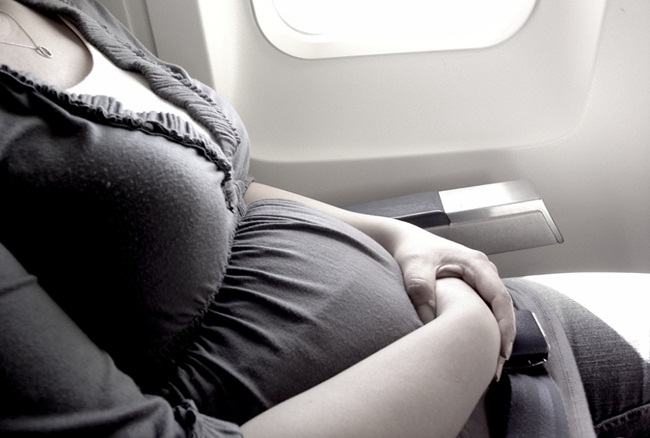
IndianEagle shares airline policies for flying during pregnancy from US to India. Different airlines have different rules for pregnant travelers.
Leave a Reply Cancel reply
Your email address will not be published. Required fields are marked *

Special Air India Flights to and from India Cost Nearly Rs 2 Lakh per Traveler for One-way Journey
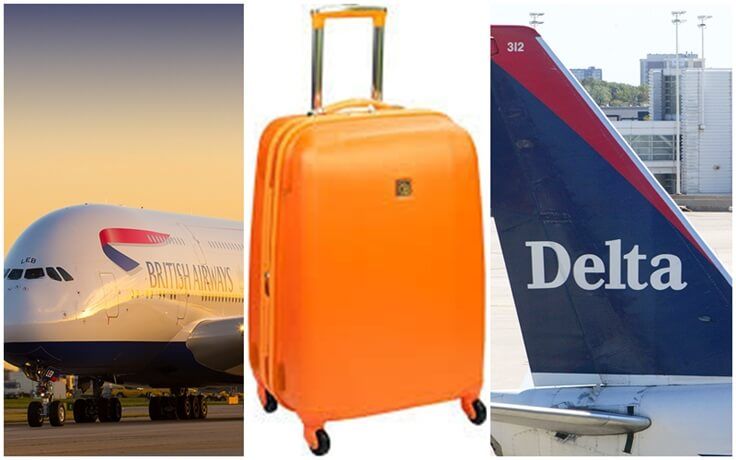
What are Hand-baggage Only Fares for British Airways and Delta Airlines Flights?

Future of Air Travel post COVID19: Empty Middle Seats or All Seats with Cover on Economy Flights
Trump’s temporary ban on immigration amid covid19 targets green cards, not h1b and other visas.

Teaching of Hindi as Second Language in Schools; Biden Receives Proposal from Indian American Leaders
- Explore Airlines That Allow You To Transform Your Stopover Into A Mini Vacation Experience – flyopedia.com
- Airfares Are Making Headlines Once More. What’s Going on?
- How To Complete The Electronic Registration Process For An H – 1B Visa – flyopedia.com
- Air India Expands Customer Support By Introducing Multilingual Language Services – flyopedia.com
- Everything You Need To Know About Lounges At Las Vegas Airport – flyopedia.com

Flying While Pregnant: Considerations to Take into Account
For several women, traveling while conceiving can be a frightening encounter. Info regarding what is secure and what isn’t is widely available, yet it is often contradictory. But when comes to pregnant passengers, certain airlines are very stringent, whereas others are less. So, could a pregnant person fly, and what precautions should be taken while flying? The reply is, “It varies.” You must make choices based on your particular situation because every pregnancy is special and unique. Nevertheless, there are numerous aspects and some specific rules that you should consider before choosing international flight tickets booking online .
Throughout this blog, we’ll delve more into the subject of flying while pregnant. We’ll go over concerns, and the best times to travel specifically overseas, for instance with flight tickets from USA to India while pregnant. We’ll also offer some advice on how to have the safest and most pleasant trip conceivable.
What to Take Into Account When Flying During Pregnancy To ensure that you & your baby are really as safe and relaxed as necessary during your flying, there seem to be numerous things and ideas you must take into account. Here’s everything you should consider for a secure, comfy journey whilst pregnant, whether you’re organizing your ideal pre-baby getaway or a work trip with international flight tickets booking online :
- When Is It Safest To Fly While Pregnant?
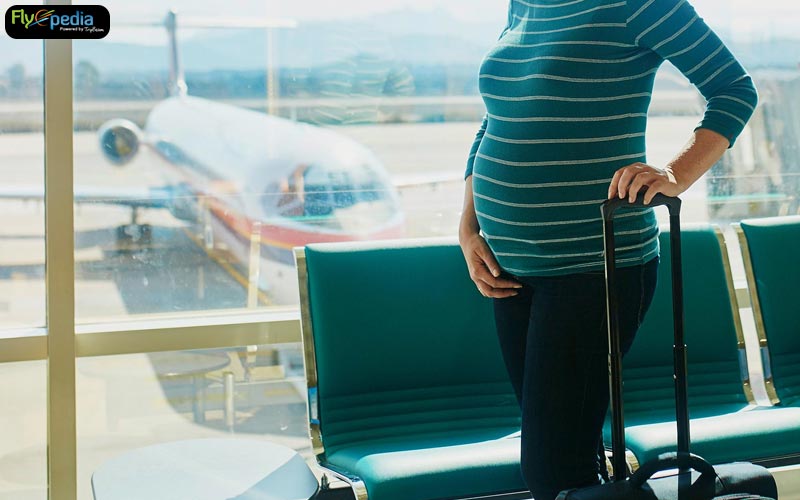
- Obey the advice of the doctor

- What Should a Pregnant Person Prepare Prior to Getting On A plane?
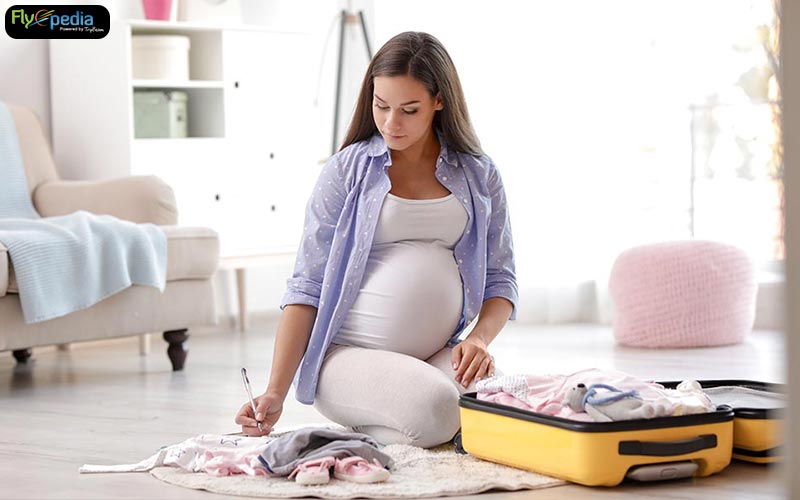
- Prepare Up for Germs

Last but not least, pack all of your essentials, such as prenatal vitamins, in your carry-on bag with clear labels if you’re screening luggage. You seldom know when your bags can become split, and the last thing you want is to get stuck without your staples.
- What to Dress While Touring During Pregnancy

- The Importance of Motion

When on board, fasten your seatbelt: A little under your tummy is the optimum place to place your seatbelt (i.e., across the thighs and below the belly). If needed, ask for a belt extension. An agent can assist you in removing your baggage off the belt conveyor once you have landed.
CONCLUSION: Despite the fact that there are things to think about before traveling, there aren’t many risks associated with traveling while pregnancy. Checking with your doctor to ensure that it is healthy for you and your baby is the most crucial step. Additionally, you should be conscious of the dangers and take precautions to reduce them. Flying while pregnant is generally safe as long as you’re in good health and have no medical issues. Simply take a few additional safety measures and watch to keep relaxed while traveling.
- Khajjiar in 2022 is all set to delight you with its bounty
- Top 5 Mysterious & eye-catching Temples for travelers booking last minute flights to India
You May Also Like

The Top Hypnotic and Must-Visit Places of Sikkim, India

All You Need to Know About Traveling on a Red-Eye Flight

Exploring Why Leh and Ladakh Top the Must-Visit List
Travelling in pregnancy
With the proper precautions such as travel insurance, most women can travel safely well into their pregnancy.
Wherever you go, find out what healthcare facilities are at your destination in case you need urgent medical attention. It's a good idea to take your maternity medical records (sometimes called handheld notes) with you so you can give doctors the relevant information if necessary.
Find out more about getting healthcare abroad .
Make sure your travel insurance covers you for any eventuality, such as pregnancy-related medical care during labour, premature birth and the cost of changing the date of your return trip if you go into labour .
When to travel in pregnancy
Some women prefer not to travel in the first 12 weeks of pregnancy because of nausea and vomiting and feeling very tired during these early stages. The risk of miscarriage is also higher in the first 3 months, whether you're travelling or not.
Travelling in the final months of pregnancy can be tiring and uncomfortable. So, many women find the best time to travel or take a holiday is in mid-pregnancy, between 4 and 6 months.
Flying in pregnancy
Flying isn't harmful to you or your baby, but discuss any health issues or pregnancy complications with your midwife or doctor before you fly.
The chance of going into labour is naturally higher after 37 weeks (around 32 weeks if you're carrying twins), and some airlines won't let you fly towards the end of your pregnancy. Check with the airline for their policy on this.
After week 28 of pregnancy, the airline may ask for a letter from your doctor or midwife confirming your due date, and that you are not at risk of complications. You may have to pay for the letter and wait several weeks before you get it.
Long-distance travel (longer than 4 hours) carries a small risk of blood clots (deep vein thrombosis (DVT)) . If you fly, drink plenty of water and move about regularly – every 30 minutes or so. You can buy a pair of graduated compression or support stockings from the pharmacy, which will help reduce leg swelling.
Travel vaccinations when you're pregnant
Most vaccines that use live bacteria or viruses aren't recommended during pregnancy because of concerns that they could harm the baby in the womb.
However, some live travel vaccines may be considered during pregnancy if the risk of infection outweighs the risk of live vaccination. Ask your GP or midwife for advice about specific travel vaccinations. Non-live (inactivated) vaccines are safe to use in pregnancy.
Malaria tablets
Some anti-malaria tablets aren't safe to take in pregnancy so ask your GP for advice.
Zika virus is mainly spread by mosquitoes found in some parts of the world. For most people it's mild and not harmful, but can cause problems if you're pregnant.
If you are pregnant, it is not recommended to travel to parts of the world where the Zika virus is present, such as parts of:
- South and Central America
- the Caribbean
- the Pacific islands
Check before you travel
It's important to check the risk for the country you're going to before you travel.
Find out more about the Zika virus risk in specific countries on the Travel Health Pro website
Car travel in pregnancy
It's best to avoid long car journeys if you're pregnant. However, if it can't be avoided, make sure you stop regularly and get out of the car to stretch and move around.
You can also do some exercises in the car (when you're not driving), such as flexing and rotating your feet and wiggling your toes. This will keep the blood flowing through your legs and reduce any stiffness and discomfort. Wearing compression stockings while on long car journeys (more than 4 hours) can also increase the blood flow in your legs and help prevent blood clots.
Tiredness and dizziness are common during pregnancy so it's important on car journeys to drink regularly and eat natural, energy-giving foods, such as fruit and nuts.
Keep the air circulating in the car and wear your seatbelt with the cross strap between your breasts and the lap strap across your pelvis under your bump, not across your bump.
Road accidents are among the most common causes of injury in pregnant women. If you have to make a long trip, don't travel on your own. You could also share the driving with your companion.
Sailing in pregnancy
Ferry companies have their own restrictions and may refuse to carry heavily pregnant women (often beyond 32 weeks on standard crossings and 28 weeks on high-speed crossings ). Check the ferry company's policy before you book.
For longer boat trips, such as cruises, find out if there are onboard facilities to deal with pregnancy and medical services at the docking ports.
Food and drink abroad in pregnancy
Take care to avoid food- and water-borne conditions, such as stomach upsets and travellers' diarrhoea . Some medicines for treating stomach upsets and travellers' diarrhoea aren't suitable during pregnancy.
Always check if tap water is safe to drink. If in doubt, drink bottled water. If you get ill, keep hydrated and continue eating for the health of your baby, even if you're not hungry.
Find out about a healthy diet in pregnancy , and foods to avoid in pregnancy .
Page last reviewed: 17 August 2022 Next review due: 17 August 2025
- Skip to main content
- Skip to site information
Language selection
Help us to improve our website. Take our survey !
Travelling while pregnant
Find useful information and considerations to help you prepare for safe and healthy travels outside Canada while pregnant.
With careful preparation, travelling while pregnant can be safe. The decision to travel should be made in consultation with your health care professional, based on your personal health circumstances.
On this page
Before you go, while you're away, if you need help.
Medical practices, health standards and infection control measures vary from country to country. You may not have access to the same level of care, procedures, treatments and medications as you would in Canada.
You could also be at increased risk of getting an infection and/or developing severe complications from certain infections, which could also affect the fetus.
Before leaving Canada:
- consult a health care professional or visit a travel health clinic at least 6 weeks before travelling to get personalized health advice and recommendations
- check our Travel Advice and Advisories for country-specific information, including about possible health risks
- know how to seek medical assistance outside of Canada
- review the policy and the coverage it provides
- most policies do not automatically cover pregnancy-related conditions or hospital care for premature infants
- ask your insurance provider about coverage for medical care during pregnancy, giving birth and intensive care for you and your fetus or newborn
- carry a copy of your prenatal records
- talk to your health care professional about any additional items you may want to bring that are specific to your health needs
Local laws and medical services relating to pregnancy can differ from Canada. Learn the local laws, and how these may apply to you before you travel.
Pre-travel vaccines and medications
Many vaccines can be safely given during pregnancy. Due to a higher risk of more severe outcomes for you and your fetus, some vaccines are recommended specifically during pregnancy, such as tetanus-diphtheria-pertussis (DTaP) and influenza.
Don’t take medications you may still have from prior trips. Tell the health care professional about your pregnancy, or intended pregnancy, before filling any prescriptions. The decision to get any pre-travel vaccinations or medications should be discussed with your health care professional.
The decision can depend on:
- your purpose of travel (e.g., tourism, visiting friends and relatives)
- your planned destination(s)
- the length of your trip
- your risk of getting a disease
- how severe the effect of a disease would be to you and/or your fetus
- your planned activities
- any underlying medical issues and/or pregnancy-related complications
Malaria could cause major health problems for a mother and her unborn baby. A pregnant woman may want to consider avoiding travel to areas where malaria transmission occurs.
Description of malaria risk by country and preventative measures.
If you can’t avoid travelling to an area where malaria is present:
- some medications to prevent or treat malaria may not be safe during pregnancy
- take extra care to protect yourself from mosquito bites
Zika virus infection during pregnancy can pose significant risks to your fetus even if you don’t develop symptoms. While pregnant, you may want to consider avoiding travelling to a country or areas with risk of Zika virus.
Latest travel health advice on Zika virus.
If you choose to travel, take precautions to avoid infection with Zika virus:
- prevent mosquito bites at all times
- protect yourself from contact with semen, vaginal fluid and blood
- always use condoms correctly or avoid sexual contact while in countries or areas with risk of Zika virus
Learn more about Zika virus and pregnancy:
- Zika virus: Pregnant or planning a pregnancy
- Zika virus: Advice for travellers
- Pregnancy and travel (tropical medicine and travel)
Monitor your health and be prepared
Emergencies can happen at any time. Know where the nearest hospital or medical centre is while you are travelling and confirm they will accept your medical insurance.
Seek medical attention immediately if you develop any of the following symptoms while travelling:
- persistent vomiting and/or diarrhea
- dehydration
- vaginal bleeding
- passing tissue or clots
- abdominal pain, cramps or contractions
- your water breaks
- excessive swelling of face, hands or legs
- excessive leg pain
- severe headaches
- visual problems
If you develop these symptoms after your return to Canada, you should see a health care professional immediately and tell them about your recent trip.
Transportation
Always wear a seatbelt when travelling by plane or car. When using a diagonal shoulder strap with a lap belt, the straps should be placed carefully above and below your abdomen. If only a lap belt is available, fasten it at the pelvic area, below your abdomen.
If you have any medical or pregnancy-related complications, discuss with your health care professional whether air travel is safe for you.
Most airlines restrict travel in late pregnancy or may require a written confirmation from a physician. Check this with the airline before booking your flight.
During long flights, you may be at higher risk of developing blood clots, known as deep vein thrombosis (DVT). The risk of deep vein thrombosis can be reduced by:
- getting up and walking around occasionally
- exercising and stretching your legs while seated
- selecting an aisle seat when possible
- wearing comfortable shoes and loose clothing
Your health care professional may recommend additional ways to reduce your risk such as wearing compression stockings.
Always stay well hydrated while travelling.
Land travel
The risk of deep vein thrombosis can be reduced by:
- stopping the vehicle to walk around every couple of hours
Motion sickness
Certain medications used to treat nausea and vomiting during pregnancy may also be effective in relieving motion sickness.
If you think you might experience motion sickness during your trip, speak to your health care professional about the use of these medications.
Environmental and recreational risks
Some activities may not be recommended or may require additional precautions. Discuss your travel plans, including any planned or potential recreational activities with a health care professional.
High altitude
You should avoid travelling to an altitude above 3,658 metres (12,000 feet).
However, if you have a high-risk pregnancy and/or are in the late stages of pregnancy, the highest altitude should be 2,500 metres (8,200 feet).
If you have pregnancy-related complications, you should avoid unnecessary high-altitude exposure.
Keep in mind that most high-altitude destinations are far from medical care services.
Personal protective measures
Food-borne and water-borne diseases.
Eat and drink safely while travelling while travelling. Many food-borne and water-borne illnesses can be more severe during pregnancy and pose a risk to the fetus.
This can include:
- toxoplasmosis
- listeriosis
- hepatitis A and E
To help avoid food-borne and water-borne diseases:
- before eating or preparing food
- after using the bathroom or changing diapers
- after contact with animals or sick people
- before and after touching raw meat, poultry, fish and seafood
- if you’re at a destination that lacks proper sanitation and/or access to clean drinking water, only drink water if it has been boiled or disinfected or if it’s in a commercially sealed bottle
- use ice made only from purified or disinfected water
- this could cause the fetus or newborn to develop thyroid problems
- unpasteurized dairy products, such as raw milk and raw milk soft cheeses
- unpasteurized juice and cider
- raw or undercooked eggs, meat or fish, including shellfish
- raw sprouts
- non-dried deli meats, including bologna, roast beef and turkey breast
- don’t use bismuth subsalicylate (Pepto-Bismol®)
- Information on travellers’ diarrhea
Illnesses acquired from insect and other animals
Protect yourself from insect bites:
- wear light-coloured, loose clothes made of tightly woven materials such as nylon or polyester
- prevent mosquitoes from entering your living area with screening and/or closed, well-sealed doors and windows
- use insecticide-treated bed nets if mosquitoes can’t be prevented from entering your living area
- information on insect bite and pest prevention
Some infections, such as rabies and influenza, can be shared between humans and animals. You should avoid contact with animals including dogs, livestock (pigs, cows), monkeys, snakes, rodents, birds, and bats.
Information for if you become sick or injured while travelling outside Canada.
For help with emergencies outside Canada, contact the:
- nearest Canadian office abroad
- Emergency Watch and Response Centre in Ottawa
More information on services available at consular offices outside Canada.
Related links
- Immunization in pregnancy and breastfeeding: Canadian Immunization Guide
- Advice for Canadians travelling to Zika-affected countries
- Advice for women travellers
- If you get sick before or after returning to Canada
- Receiving medical care in other countries
- Travel vaccinations
- What you can bring on a plane
- Tips for healthy travel
- Italiano
- Deutsch
- Español
- Français
- 日本語
- Norsk
- Svenska
- Dansk
- Nederlands
- Suomi
- Português
- Ελληνικά
- Magyar
- Čeština
- 한국어
- Hrvatski
- Polski
- עִברִית

- ESTA Requirements
- Visa Waiver Program
Traveling to the U.S. while pregnant
Updated: Aug 25, 2023 | Tags: ESTA Requirements , USA Visa Restrictions , USA Immigration
Visa restrictions can make it harder for pregnant women to enter the United States
Some recent U.S. policies have made it difficult for foreign nationals traveling to the United States during pregnancy to gain “birth right citizenship” for their child. According to figures from the U.S. Centers for Disease Control and Prevention, about 10,000 babies were born in the United States to foreign nationals in 2017. In January 2020, the U.S. Department of State (Bureau of Consular Affairs) issued new rules allowing embassies and consulates to refuse applications from pregnant women for B1 and B-2 visas if they believe the reason for visiting the U.S. is to give birth in the country for “birth tourism” purposes.
Many airlines already have policies restricting travel later in pregnancy. Most carriers allow traveling up to the 36th week although some may have an earlier cut-off date. The rules vary amongst the carriers and may also depend on domestic or international travel. Women traveling to the United States when pregnant must also meet immigration requirements.

What are U.S. immigration laws on pregnant travelers?
United States immigration laws regard pregnancy in the same way as other medical conditions. This means that if you enter the U.S. on a B-2 visa, you must have private health insurance or sufficient funds to pay for any medical care you might need. Giving birth in the United States can be costly. For example, a straightforward birth without any complications can cost around $10,000 USD.
What are the recent changes to visa regulations affecting pregnant travelers entering the U.S.?
In January 2020, a significant amendment to visa regulations came into force. The new rules restrict the approval of B-2 tourist visas to pregnant women. The aim is to prevent the practice of traveling to the U.S. to give birth so that the child can automatically obtain United States citizenship.
Will the changes affect all pregnant travelers?
The rule changes do not affect anyone in the process of seeking a green card (permanent lawful residence) or temporary non-immigrant visas such as H-1B employment visas, F-1 academic, and M-1 student visas. People traveling to the U.S. on previously obtained visas are also exempt, as are citizens of countries participating in the Visa Waiver Program .
Under the new restrictions, a woman applying for a B-2 visa whose due date falls during the period for which their visa is valid will be deemed to be traveling to the United States with the intention of obtaining citizenship for their child. To obtain a visa successfully, a pregnant woman will now need to demonstrate a valid reason for visiting or proof that they will return before the due date. If they have any documentary evidence to support their case, it will be required at their visa interview .
Will the rules make it harder to obtain a U.S. visa for pregnant travelers?
It is still possible for a pregnant woman to be granted a tourist visa for medical treatment in the United States, for example, if specialist care is needed. The applicant will need to show that a U.S. physician has agreed to provide the required treatment and that they have sufficient funds to pay for any procedures or care.
How will pregnant travelers be pre-screened before boarding a flight to the United States?
International airlines are responsible for paying your return travel if you are denied entry into a destination country. Thus, airlines pre-screen passengers to determine if they meet the destination country’s entry requirements. If the airlines fail to complete these checks, they may be fined heavily.
If a woman is visibly pregnant, she might be asked for documentation proving that she will return before the due date or that she has the means to pay for medical care in the U.S. Airlines are concerned about the risks of a woman going into labor during a flight and also about the problems of arranging an urgent return flight for her if entry is denied.
How will pregnant travelers be screened on arrival at a U.S. airport?
On arrival at a U.S. airport , pregnant women are screened by Customs and Border Protection (CBP) officers. CBP may question the pregnant traveler’s ability to pay for medical costs associated with giving birth in the United States. The closer she is to her due date, the more closely the CBP officers will focus on her financial status.
For example, if you are 24 weeks pregnant and are planning to stay in the United States for a couple of weeks, you will probably be allowed to enter, especially if you have visited in the past and respected the conditions of your visa. On the other hand, if you are 32 weeks pregnant and plan to stay for three weeks, the risk of going into labor during that time is higher so CBP will require proof that you have adequate medical insurance or can pay for medical treatment.
CBP pre-screening also takes place in Toronto and some other foreign cities with CBP pre-clearance. This means that U.S. immigration screening has taken place before you board the flight to the U.S.
How will pregnant travelers be screened on arrival at a U.S. land border?
CBP take the same factors into consideration when a pregnant woman enters the U.S. at a land border. They are more likely than the officers at airports to see pregnant travelers who are close to their due date because women in the later stages of pregnancy would probably have been refused permission to fly by their airlines. At land borders, a woman might state that she wants to enter the U.S. just for a day, to visit relatives, or for shopping.
If CBP officers a land border deny entry to a pregnant woman, they have fewer concerns about detaining and then repatriating her, because most travelers arrive by car and can be processed quickly.
What are the potential long-term consequences of entry to the United States being denied because of pregnancy?
Being denied entry to the U.S. during pregnancy can have significant consequences.
- If you are traveling to the United States from a VWP country, you will no longer be able to use the Visa Waiver Program.
- If you are denied entry on a visitor visa, for example, a B-2 visa, and are refused entry, you will probably have to apply for another visa when you next wish to travel to the U.S. This might not be granted and you might be prevented from entering the U.S. for a further 3 years, due to previously being denied entry.
- If you are pregnant and have given birth in the United States before, you will probably be asked if you paid for your medical needs on that occasion. If you did not, you will likely be barred from entering.
Other considerations when traveling to the U.S. while pregrant
Visa and entry requirements: esta or visa.
The first consideration, if you're not a U.S. citizen, is whether you'll need a visa or an Electronic System for Travel Authorization ( ESTA ) under the VWP. You must meet all the standard requirements, but additional scrutiny could be applied given your condition.
Medical Documentation and Emergency Preparedness
Some airlines and immigration authorities might request a doctor's note certifying that you are fit to travel. This note should include your due date and any medical conditions that might require special attention.
Research and make a list of nearby hospitals or healthcare facilities. Store this information on your phone and keep a printed copy as well.
Health Insurance
Make sure you have comprehensive travel insurance that covers prenatal care and emergency delivery in the U.S., which can be expensive.
Vaccinations and Medications
Consult your healthcare provider about any vaccinations you might need and the safety of taking antimalarial or other prophylactic medication.
Travel Timing
The second trimester is usually considered the safest time for pregnant women to travel. Morning sickness is typically less severe, and the risk of miscarriage or premature labor is lower.
In-Flight Comfort and Safety
- Opt for an aisle seat for easier mobility.
- Wear loose, breathable clothing.
- Use seat belts below your bump, not across it.
- Take short walks and do ankle exercises to encourage blood circulation and reduce the risk of deep vein thrombosis (DVT).
- Pack Snacks - The in-flight meal service might not align with your eating schedule, so pack healthy snacks like fruits, nuts, or granola bars.
- Stay Hydrated - Air travel can be dehydrating, which is especially concerning for pregnant women. Make sure to drink plenty of fluids, avoiding caffeine and alcohol.
If you are planning to travel to the U.S. in the later weeks of pregnancy, it is essential to ensure that you can either pay for any medical care yourself or that you have sufficient health insurance to pay all associated costs. The consequences of not following CBP’s guidance or U.S. immigration law when traveling while pregnant can have lasting consequences on a travelers ability to enter the United States.
Latest Tweets
Latest posts.
- U.S. Visa Waiver Program versus the Guam-CNMI Visa Waiver Program - Apr 17, 2024
- What is the Guam-CNMI Visa Waiver Program? - Mar 13, 2024
- What happens if I overstay my ESTA or Visa in the U.S.? - Feb 14, 2024
- Why is taking photographs forbidden at U.S. Passport Control? - Jan 17, 2024
- ESTA Glossary of Key Terms - Dec 13, 2023
- April 2024 (1)
- March 2024 (1)
- February 2024 (1)
- January 2024 (1)
- December 2023 (1)
- November 2023 (1)
- October 2023 (1)
- September 2023 (2)
- August 2023 (2)
- July 2023 (2)
- USA Visa (44)
- USA Immigration (42)
- USA Visa Requirements (35)
- ESTA Requirements (27)
- ESTA Eligibility (23)
- COVID-19 (22)
- Border Security (18)
- ESTA Application (15)
- Travel Restrictions (14)
- Terms and Conditions
© 2011-2024 USA-ESTA.COM . All rights reserved.
We are not affiliated with any government or embassy. This website only provides information about the U.S. ESTA. This website does not provide any services. This website contains links to third-party websites. For additional information, please see our Privacy Policy.
Telephone support
You need to have placed an order on this website to get assistance. For faster service, please email: [email protected] . Enter your order number below to view the support telephone number.
This site uses cookies only for analytics purposes. Opt-out on the privacy policy page. Or agree and continue ✖

IMAGES
VIDEO
COMMENTS
Minimum age of travel. The minimum age of travel for your little one is seven days. An exception to the above guidelines is possible in a medical emergency. You will need: A medical certificate from your paediatrician. Clearance from our medical department. Do reach out to our customer service and they will be happy to guide you.
Pregnant travelers should avoid travel to areas with malaria, as it can be more severe in pregnant women. Malaria increases the risk for serious pregnancy problems, including premature birth, miscarriage, and stillbirth. If you must travel to an area with malaria, talk to your doctor about taking malaria prevention medicine.
According to Air India's policy for pregnant travelers, expectant women in good health can fly till the 32 nd week of pregnancy. Air India permits traveling during pregnancy to women with high possibility of normal delivery till the 35 th week. In this case, a medical certificate ascertaining their fitness for flying on long-haul routes is ...
Virgin Australia. No restrictions. Travel permitted; requires a medical certificate dated within 10 days of departure date once you reach 28 weeks. For flights longer than four hours, travel is not permitted after 36 weeks of pregnancy (32 weeks if pregnant with multiples), or within 48 hours of normal vaginal delivery.
After 37 weeks, pregnant women will not be allowed to travel. For multiple pregnancies, a certificate is required between the 29th and 32nd week; after that, women will not be allowed to travel. The medical certificate must include the following: Be issued and signed by a doctor or midwife.
During a healthy pregnancy, occasional air travel is almost always safe. Most airlines allow you to fly domestically until about 36 weeks of pregnancy. Your ob-gyn can provide proof of your due date if you need it. If you are planning an international flight, the cut-off for traveling may be earlier. Check with your airline.
Expectant mothers may be permitted to fly on IndiGo flights only till the end of 32 weeks of pregnancy. Fit to Fly certificate from the treating obstetrician, dated not more than 3 days before the date of travel, is required only if the pregnancy is between 28th & 32nd week. Expectant mothers shall not be allowed to travel beyond 32 weeks of ...
Most airlines in the United States allow pregnant women to fly domestically in their third trimester before the 36th week. Some international flights restrict travel after 28 weeks. Flying isn't ...
Go Air rules for pregnant ladies in India: Single Pregnancy: Multiple Pregnancy* Complicated Pregnancy** Max Travel Time: 36 weeks: 36 weeks: 36 weeks: Require fit to fly medical certificate for pregnancy travel from treating obstetrician along with a copy (dated not more than 24 hours before the date of travel) 28 - 36 week: 28 - 36 week ...
Answer From Mary Marnach, M.D. Generally, air travel before 36 weeks of pregnancy is considered safe for people who aren't dealing with any pregnancy problems. Still, if you're pregnant, it's a good idea to talk with your health care provider before you fly. Your provider might suggest that you not fly if you have certain pregnancy ...
ABSTRACT: In the absence of obstetric or medical complications, occasional air travel is safe for pregnant women. Pregnant women can fly safely, observing the same precautions for air travel as the general population. Because severe air turbulence cannot be predicted and the subsequent risk for trauma is significant should this occur, pregnant women should be instructed to use their seat belts ...
Embarking on air travel during pregnancy is generally safe, with considerations varying by trimester. Consult your healthcare provider for personalized advice. Most airlines permit flying during ...
British Airways does not permit pregnant women to fly after the 36th week if they're pregnant with 1 baby or after the 32nd week for more than 1 baby. The airline recommends expectant mothers travel with a note from their doctor or midwife confirming: If the pregnancy is single or multiple. Expected due date.
Things that may prevent travel during pregnancy. As with so many other aspects of pregnancy, you'll need to plan ahead before you head out. Dr. Ekman shares a few things to consider before you ...
Airline policies for flying during pregnancy IndianEagle shares airline policies for flying during pregnancy from US to India. Different airlines have different rules for pregnant travelers.
Pregnancy and travel: are they combinable? Actually, during pregnancy, you can still do many of the things you enjoyed before, including travel. Here, we want to share some tips on how to make your traveling during pregnancy more comfortable. All recommendations are based on a position statement by the European Board and College of Obstetrics ...
The pregnancy is typically optimal, however, women with low-risk pregnancies can certainly travel at any stage even with last minute flight tickets. During the third trimester, you'll probably be over your morning sickness from the first month, but you won't have begun experiencing third-trimester discomforts yet.
Well first, 22 weeks is probably a good time to go. You'll likely be feeling pretty good - but that varies for everyone. I went to India a few years ago for a friends wedding. We went to Delhi, Agra and Jaipur. We stayed in 5* hotels the whole time we were there.
U.S. Customs and Border Protection (CBP), the agency whose officers meet visitors upon arrival to the U.S., looks closely at a pregnant visitor's ability to pay for the birth if she goes into labor while visiting the country. The higher the likelihood that you will go into labor during your visit, the more CBP will be focused on your ability to ...
Some women prefer not to travel in the first 12 weeks of pregnancy because of nausea and vomiting and feeling very tired during these early stages. The risk of miscarriage is also higher in the first 3 months, whether you're travelling or not. Travelling in the final months of pregnancy can be tiring and uncomfortable.
You should avoid travelling to an altitude above 3,658 metres (12,000 feet). However, if you have a high-risk pregnancy and/or are in the late stages of pregnancy, the highest altitude should be 2,500 metres (8,200 feet). If you have pregnancy-related complications, you should avoid unnecessary high-altitude exposure.
Some recent U.S. policies have made it difficult for foreign nationals traveling to the United States during pregnancy to gain "birth right citizenship" for their child. According to figures from the U.S. Centers for Disease Control and Prevention, about 10,000 babies were born in the United States to foreign nationals in 2017. In January ...